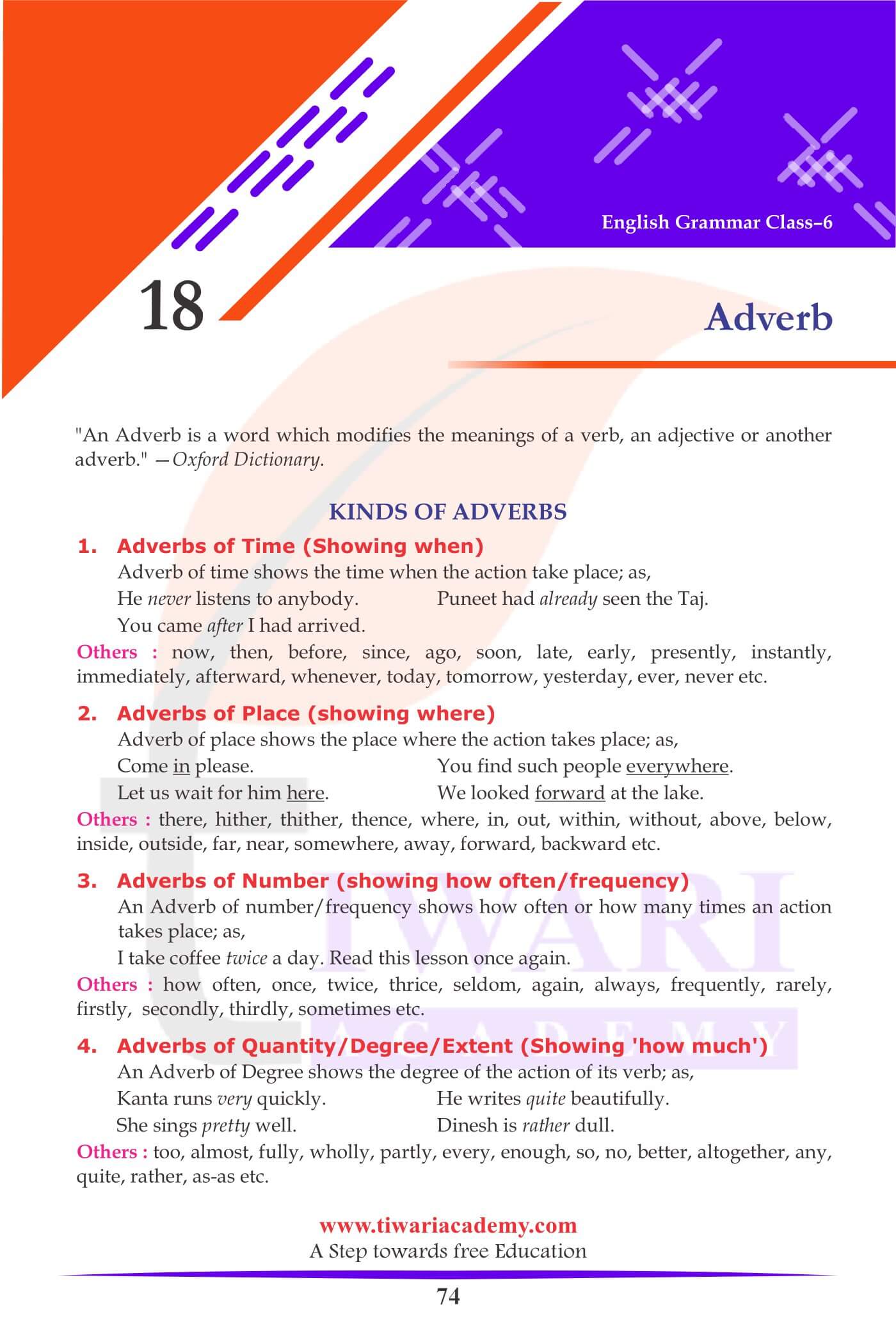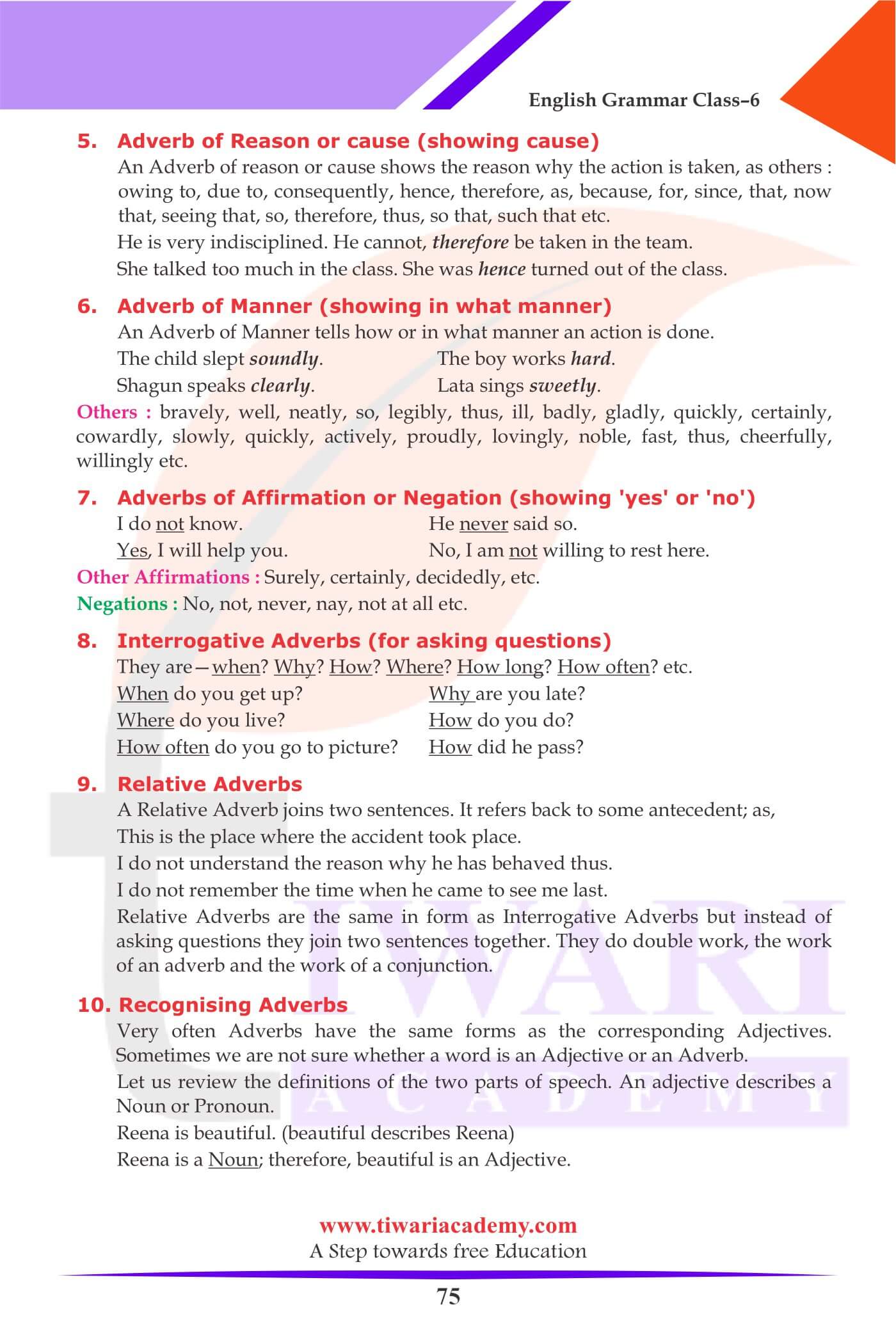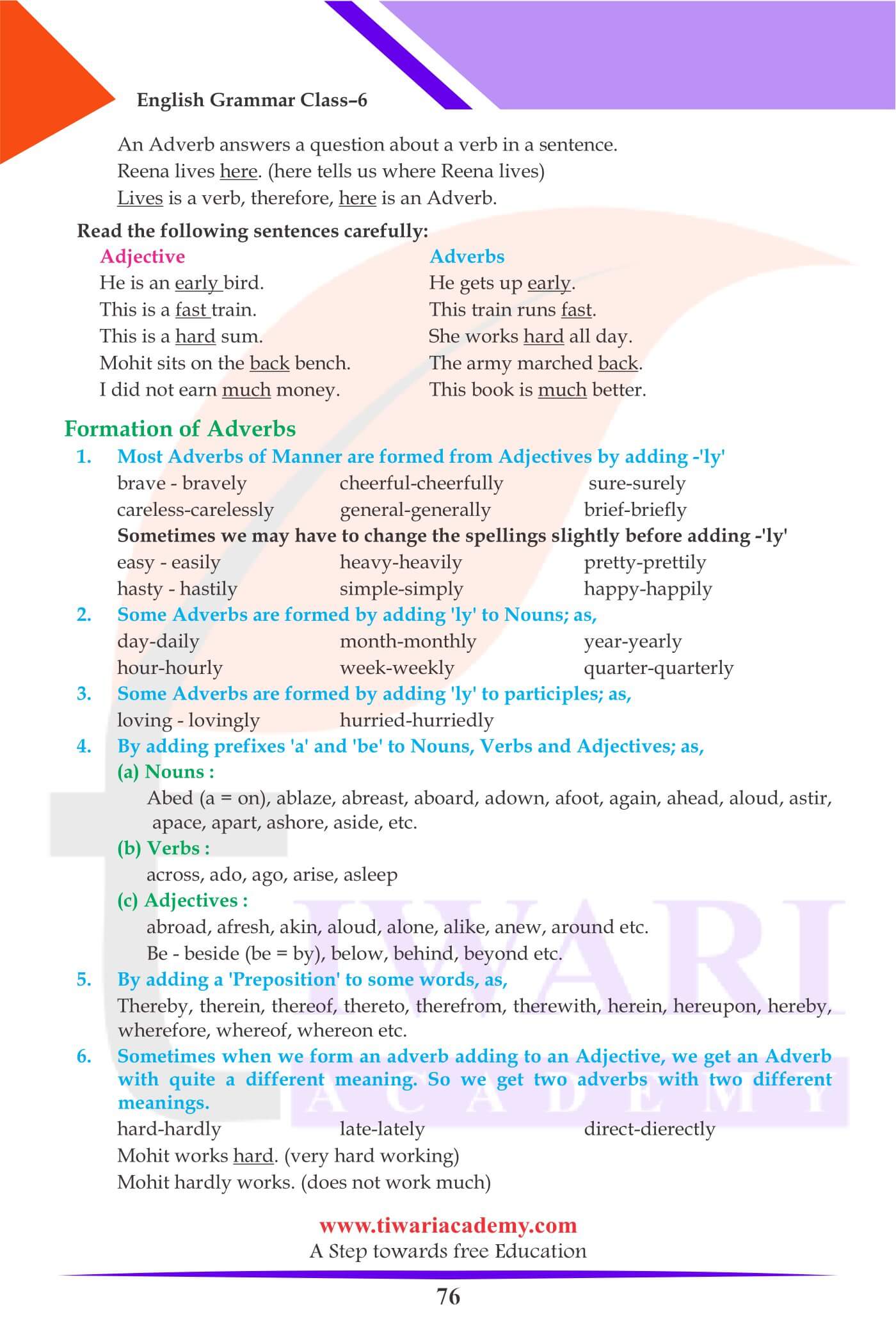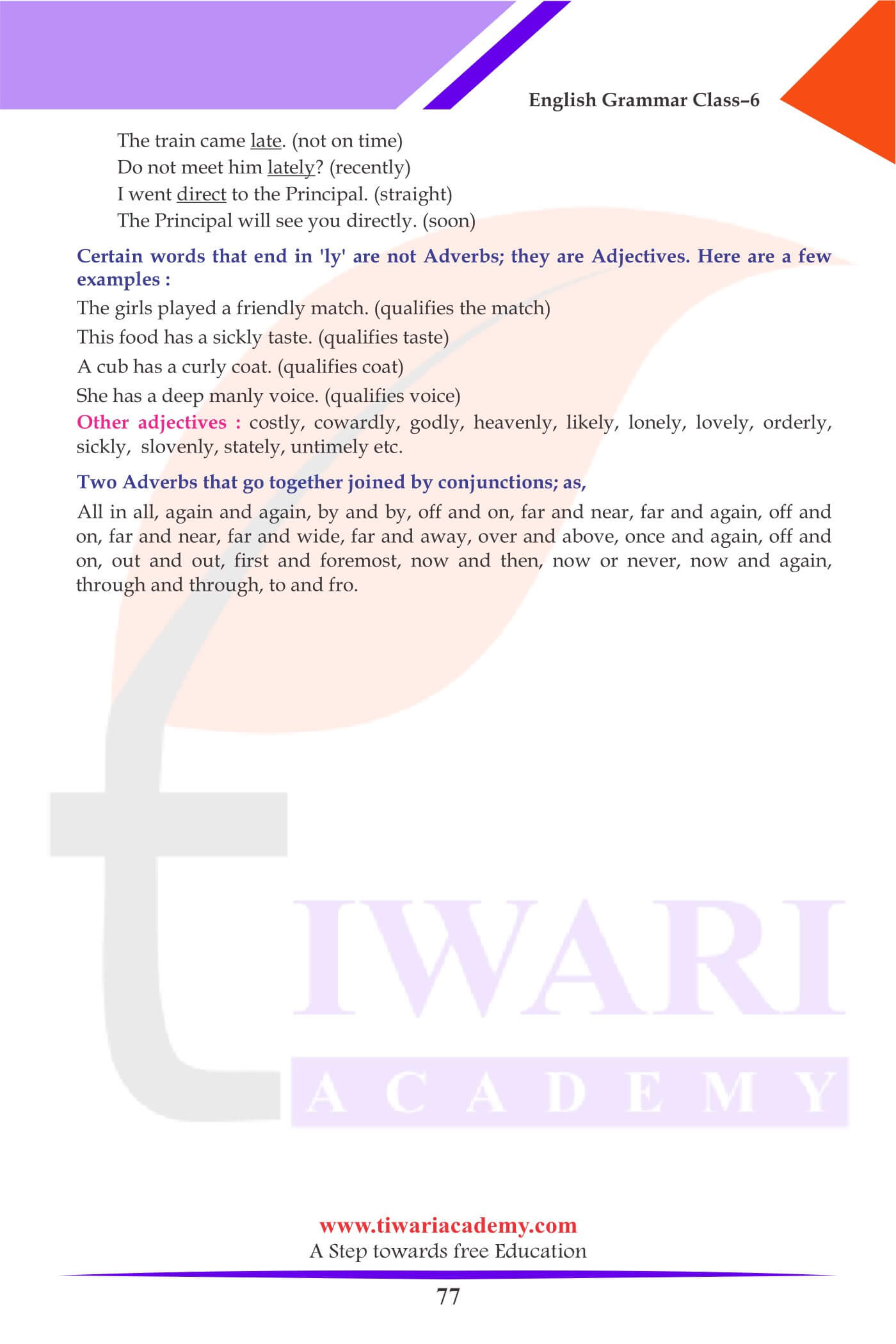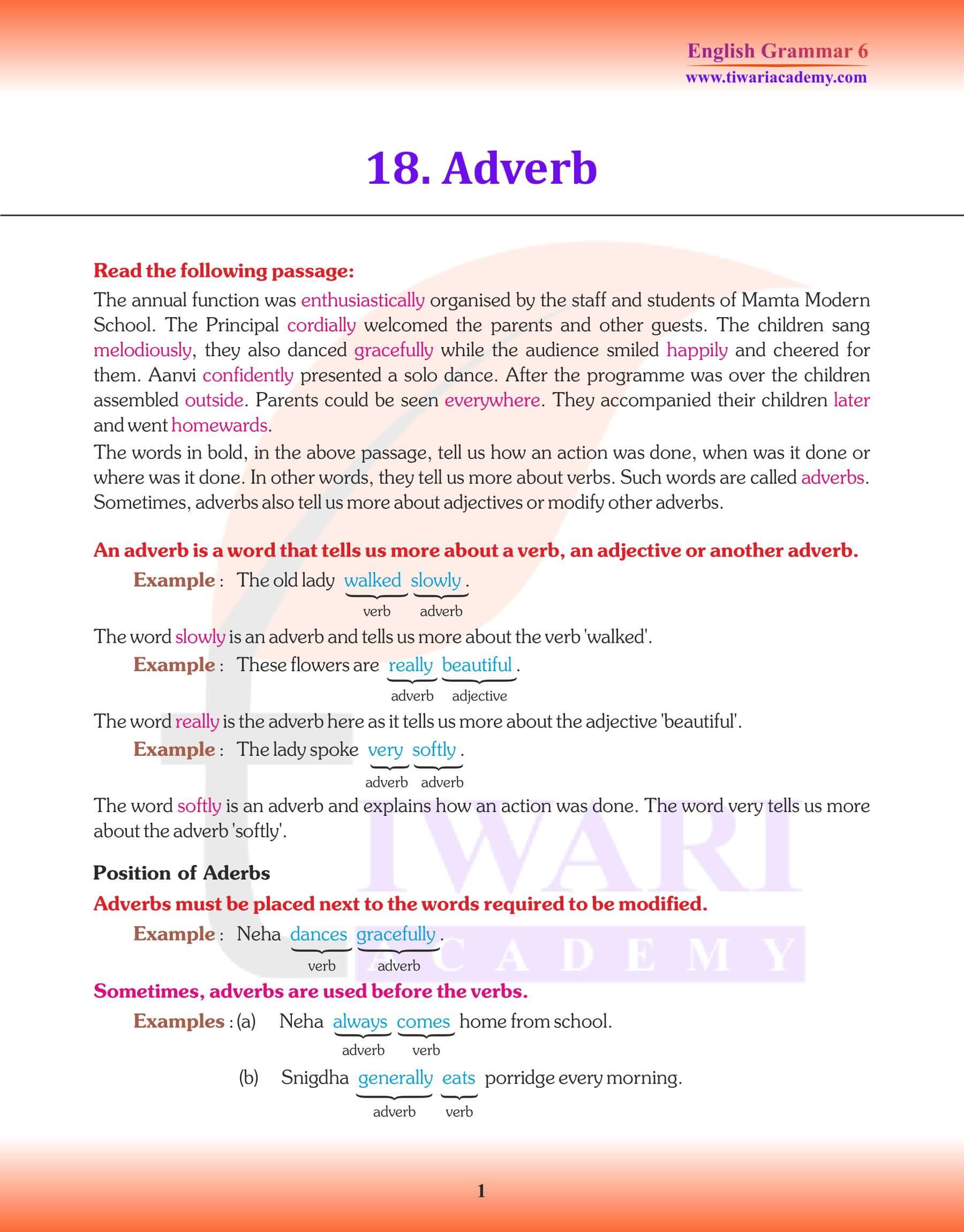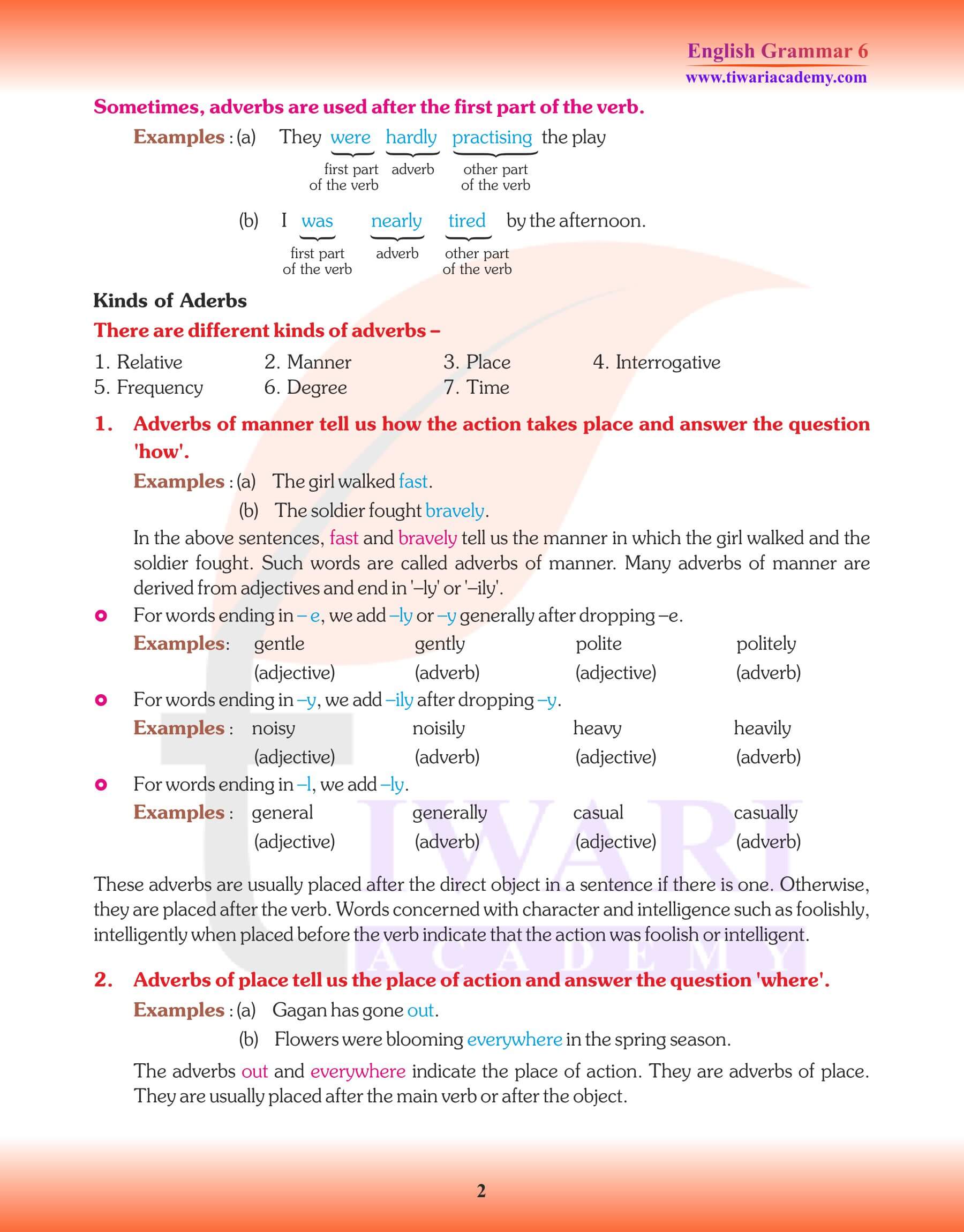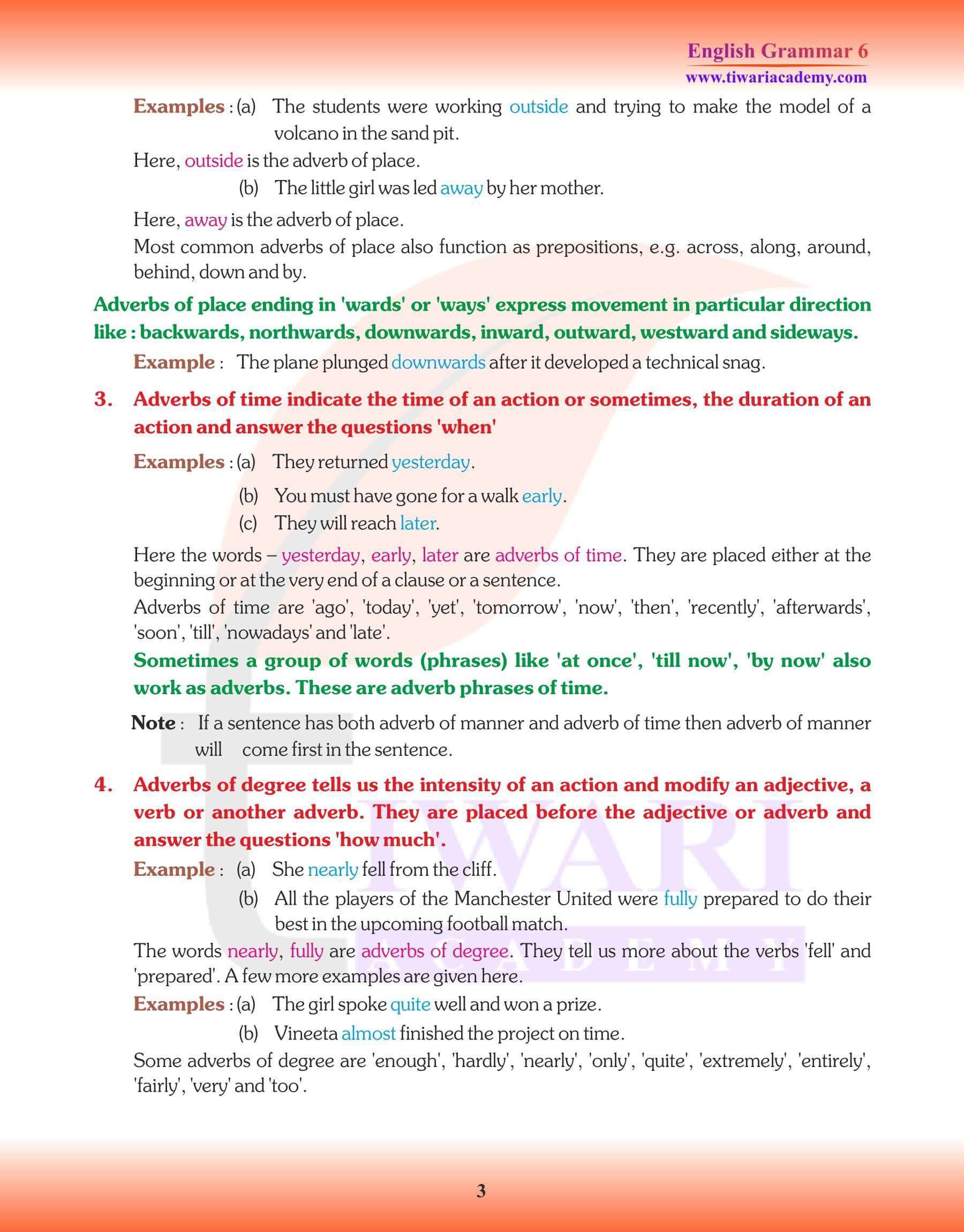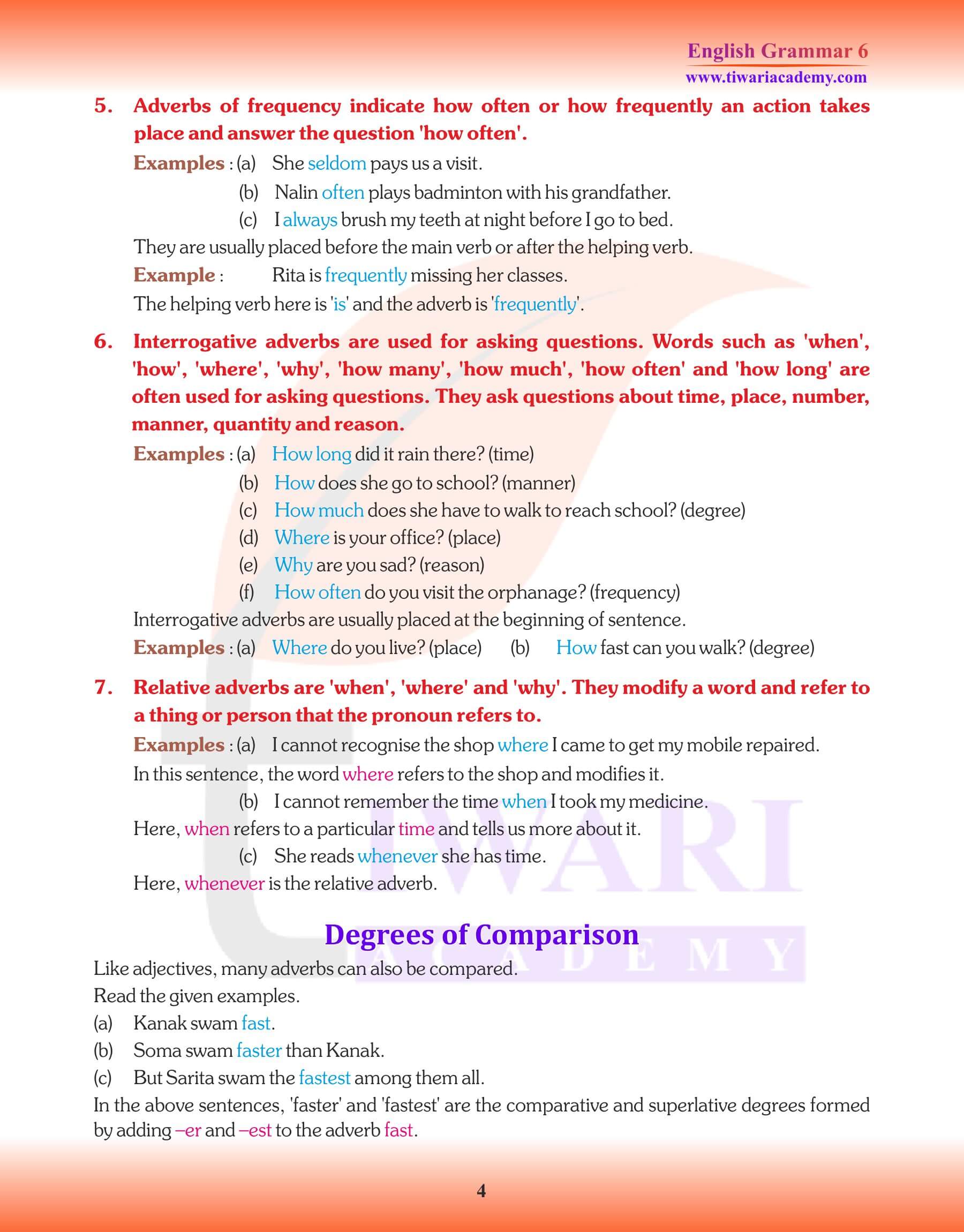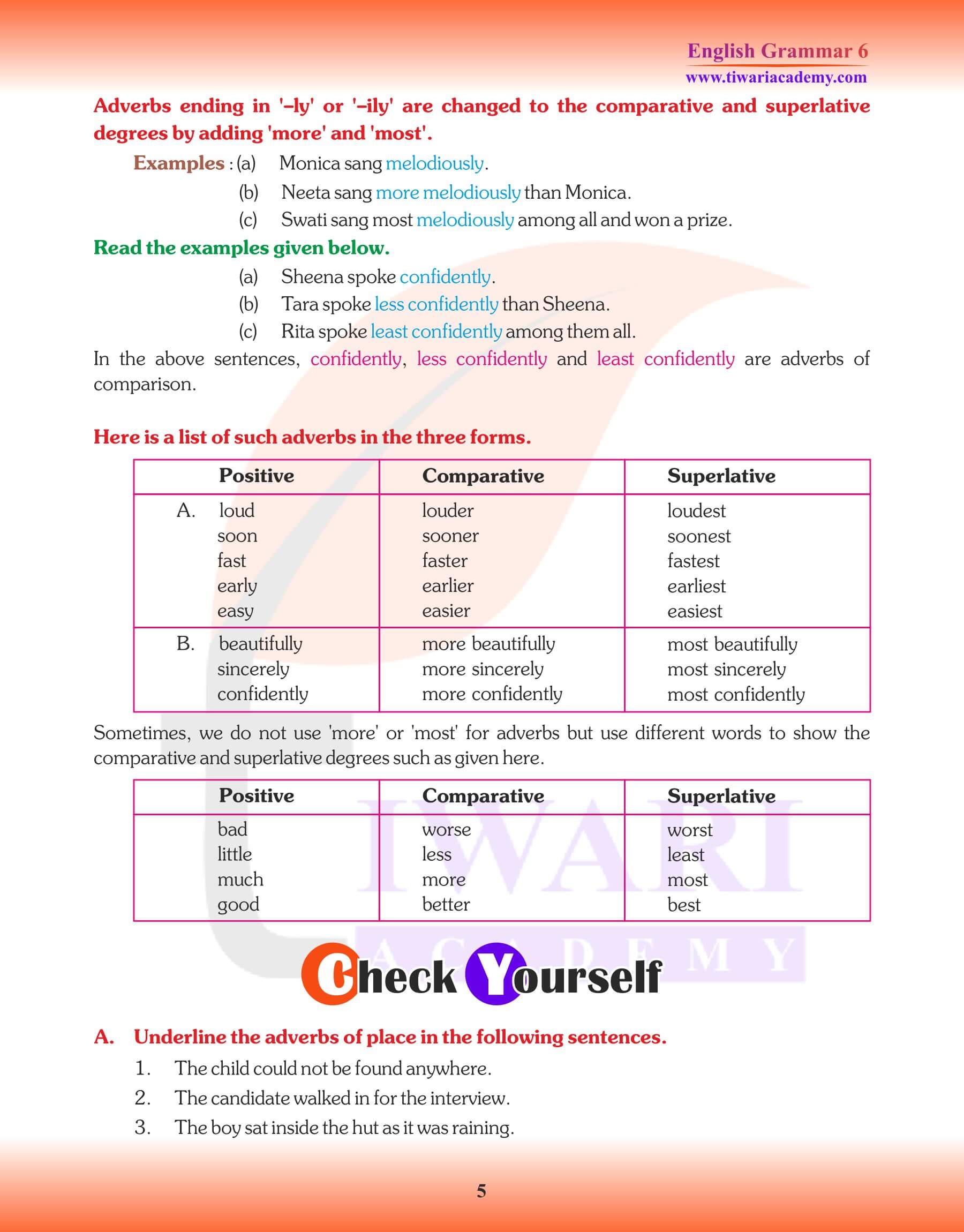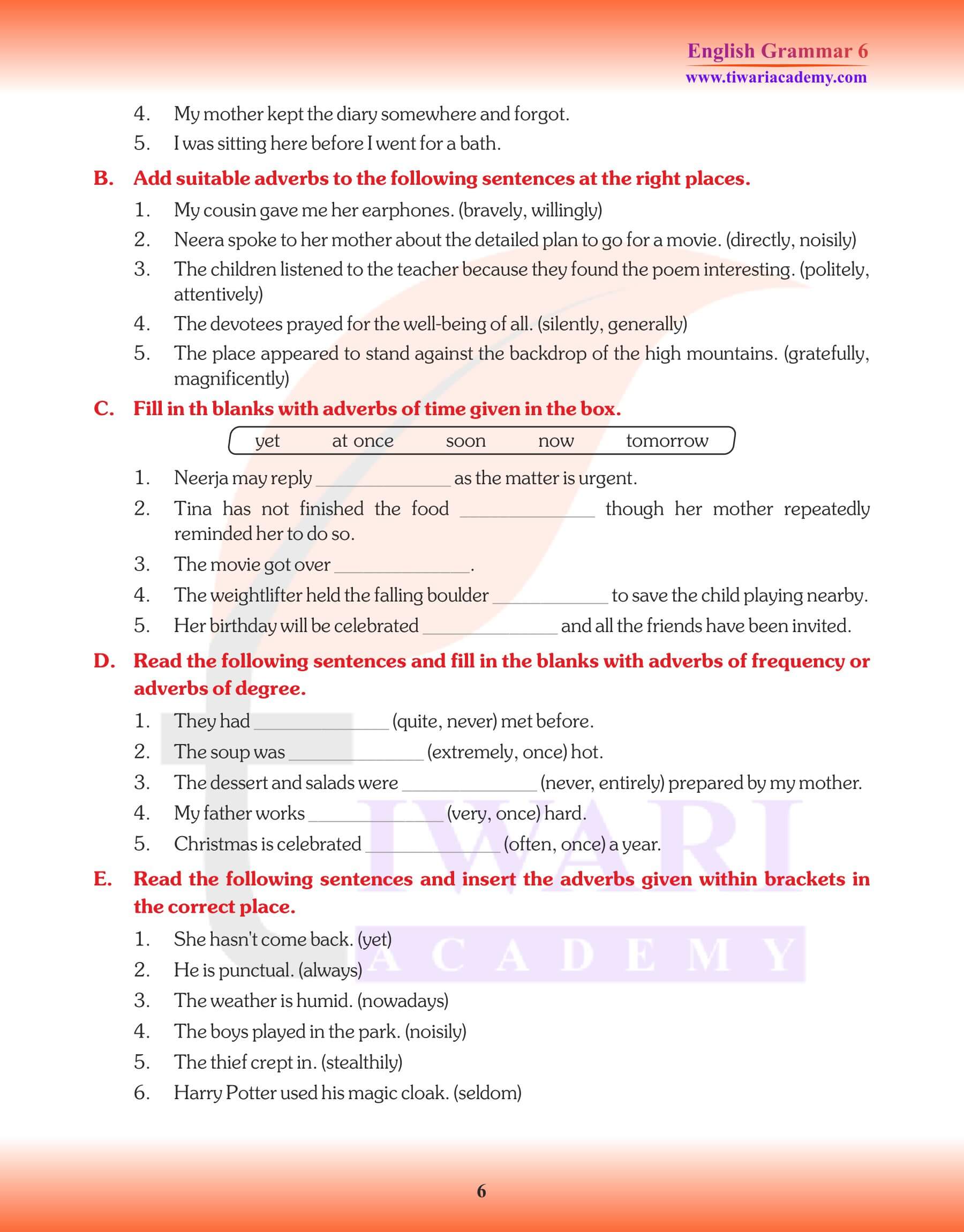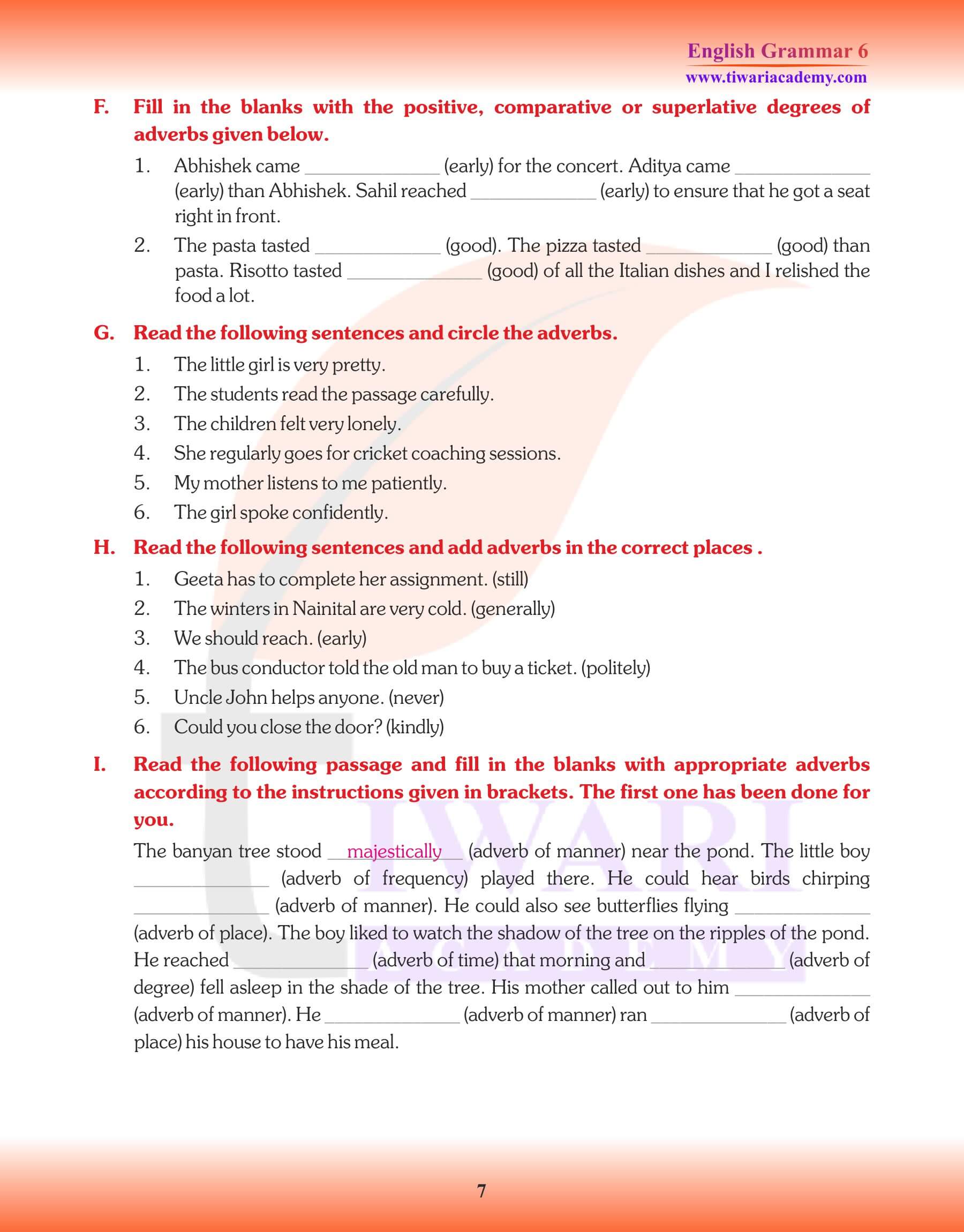Class 6 English Grammar Chapter 18 Adverb and its kinds. According to Oxford Dictionary, an Adverb is a word which modifies the meanings of a verb, an adjective or another adverb. Here, students can see various sentences with example to understand more about adverbs and its different kinds.
Class 6 English Grammar Chapter 18 Adverb and its Kinds
| Class: 6 | English Grammar |
| Chapter: 18 | Adverbs and its Kinds |
| Content: | Textbook and Revision Notes |
| Session: | 2024-25 |
Kinds of Adverbs
Adverbs of Time: (Showing when)
Adverb of time shows the time when the action take place; as,
1. He never listens to anybody.
2. Puneet had already seen the Taj.
3. You came after I had arrived.
Others : now, then, before, since, ago, soon, late, early, presently, instantly,
immediately, afterward, whenever, today, tomorrow, yesterday, ever, never etc.
Adverbs of Place
(showing where)
Adverb of place shows the place where the action takes place; as,
1. Come in please.
2. You find such people everywhere.
3. Let us wait for him here.
4. We looked forward at the lake.
Others : there, hither, thither, thence, where, in, out, within, without, above, below,
inside, outside, far, near, somewhere, away, forward, backward etc.
Adverbs of Number
(showing how often/frequency)
An Adverb of number/frequency shows how often or how many times an action takes place; as,
I take coffee twice a day.
Read this lesson once again.
how often, once, twice, thrice, seldom, again, always, frequently, rarely, firstly, secondly, thirdly, sometimes etc.
Adverbs of Quantity or Degree or Extent
(Showing “how much”)
An Adverb of Degree shows the degree of the action of its verb; as,
1. Kanta runs very quickly.
2. He writes quite beautifully.
3. She sings pretty well.
4. Dinesh is rather dull.
Others : too, almost, fully, wholly, partly, every, enough, so, no, better, altogether, any, quite, rather, as-as etc.
Adverb of Reason or cause
(showing cause)
An Adverb of reason or cause shows the reason why the action is taken, as others :
owing to, due to, consequently, hence, therefore, as, because, for, since, that, now
that, seeing that, so, therefore, thus, so that, such that etc.
He is very indisciplined. He cannot, therefore be taken in the team.
She talked too much in the class. She was hence turned out of the class.
Adverb of Manner
(showing in what manner)
An Adverb of Manner tells how or in what manner an action is done.
1. The child slept soundly.
2. The boy works hard.
3. Shagun speaks clearly.
4. Lata sings sweetly.
Others : bravely, well, neatly, so, legibly, thus, ill, badly, gladly, quickly, certainly,
cowardly, slowly, quickly, actively, proudly, lovingly, noble, fast, thus, cheerfully, willingly etc.
Adverbs of Affirmation or Negation
(showing “yes” or “no”)
1. I do not know.
2. He never said so.
3. Yes, I will help you.
4. No, I am not willing to rest here.
Other Affirmations : Surely, certainly, decidedly, etc.
Negations : No, not, never, nay, not at all etc.
Interrogative Adverbs
(for asking questions)
1. They are—when? Why? How? Where? How long? How often? etc.
2. When do you get up?
3. Why are you late?
4. Where do you live?
9. Relative Adverbs:
A Relative Adverb joins two sentences. It refers back to some antecedent; as,
This is the place where the accident took place.
1. I do not understand the reason why he has behaved thus.
2. I do not remember the time when he came to see me last.
Relative Adverbs are the same in form as Interrogative Adverbs but instead of
asking questions they join two sentences together. They do double work, the work
of an adverb and the work of a conjunction.
Recognising Adverbs
Very often Adverbs have the same forms as the corresponding Adjectives.
Sometimes we are not sure whether a word is an Adjective or an Adverb.
Let us review the definitions of the two parts of speech. An adjective describes a
Noun or Pronoun.
Reena is beautiful. (beautiful describes Reena)
Reena is a Noun; therefore, beautiful is an Adjective.
An Adverb answers a question about a verb in a sentence.
Reena lives here. (here tells us where Reena lives)
Lives is a verb, therefore, here is an Adverb.
Read the following sentences carefully:
| Adjective | Adverbs |
|---|---|
| He is an early bird. | He gets up early. |
| This is a fast train. | This train runs fast. |
| This is a hard sum. | She works hard all day. |
| Mohit sits on the back bench. | The army marched back. |
| I did not earn much money. | This book is much better. |
Formation of Adverbs:
1. Most Adverbs of Manner are formed from Adjectives by adding -“ly”
| brave – bravely | cheerful-cheerfully | sure-surely |
|---|---|---|
| careless-carelessly | general-generally | brief-briefly |
Sometimes we may have to change the spellings slightly before adding -“ly”
| easy – easily | heavy-heavily | pretty-prettily |
|---|---|---|
| hasty – hastily | simple-simply | happy-happily |
2. Some Adverbs are formed by adding “ly” to Nouns; as,
| day-daily | month-monthly | year-yearly |
|---|---|---|
| hour-hourly | week-weekly | quarter-quarterly |
3. Some Adverbs are formed by adding “ly” to participles; as,
| loving – lovingly | hurried-hurriedly |
|---|
4. By adding prefixes “a” and “be”‘ to Nouns, Verbs and Adjectives; as,
(a) Nouns:
Abed (a = on), ablaze, abreast, aboard, adown, afoot, again, ahead, aloud, astir, apace, apart, ashore, aside, etc.
(b) Verbs:
across, ado, ago, arise, asleep
(c) Adjectives:
abroad, afresh, akin, aloud, alone, alike, anew, around etc.
Be – beside (be = by), below, behind, beyond etc.
5. By adding a “Preposition” to some words, as,
Thereby, therein, thereof, thereto, therefrom, therewith, herein, hereupon, hereby, wherefore, whereof, whereon etc.
6. Sometimes when we form an adverb adding to an Adjective, we get an Adverb
with quite a different meaning. So we get two adverbs with two different meanings.
| hard-hardly | late-lately | direct-dierectly |
|---|
1. Mohit works hard. (very hard working)
2. Mohit hardly works. (does not work much)
3. The train came late. (not on time)
4. Do not meet him lately? (recently)
5. I went direct to the Principal. (straight)
6. The Principal will see you directly. (soon).
Certain words that end in “ly” are not Adverbs; they are Adjectives. Here are a few
examples:
1. The girls played a friendly match. (qualifies the match)
2. This food has a sickly taste. (qualifies taste)
3. A cub has a curly coat. (qualifies coat)
4. She has a deep manly voice. (qualifies voice)
Other adjectives : costly, cowardly, godly, heavenly, likely, lonely, lovely, orderly, sickly, slovenly, stately, untimely etc.
Two Adverbs that go together joined by conjunctions; as,
All in all, again and again, by and by, off and on, far and near, far and again, off and
on, far and near, far and wide, far and away, over and above, once and again, off and
on, out and out, first and foremost, now and then, now or never, now and again, through and through, to and fro.
